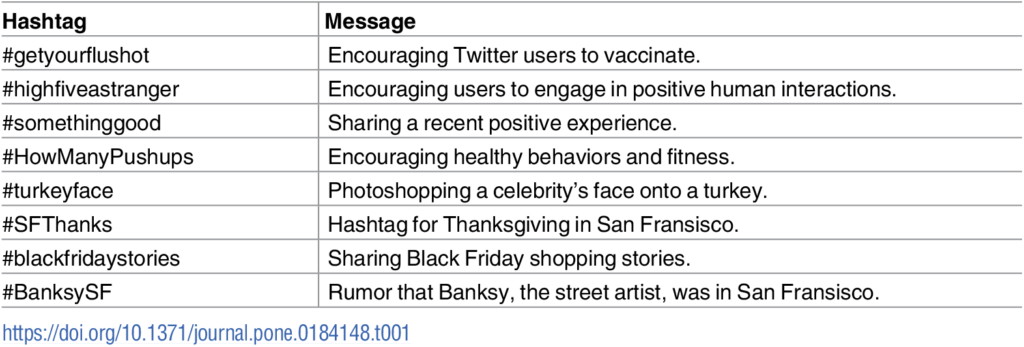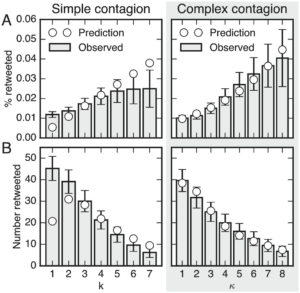Our latest work, titled “Evidence of complex contagion of information in social media: An experiment using Twitter bots” was published in Plos One on September 22, 2017!
In this study, in collaboration with Bjarke Mønsted, Piotr Sapieżyński, and Sune Lehmann from the Denmark Technical University (DTU), we studied the effects of deploying positive interventions on Twitter using social bots.
 The DTU team developed and deployed 39 Twitter bots, which connected within the community of users of San Francisco, during the second half of 2014. Starting in early October 2014 and throughout the rest of the year, the bots, some of which accrued thousands of followers, started to introduce positive memes, (listed in the table), to foster public health, fitness behaviors, and doing social good.
The DTU team developed and deployed 39 Twitter bots, which connected within the community of users of San Francisco, during the second half of 2014. Starting in early October 2014 and throughout the rest of the year, the bots, some of which accrued thousands of followers, started to introduce positive memes, (listed in the table), to foster public health, fitness behaviors, and doing social good.
By using mathematical modelling in combination with statistical techniques, we used the data we collected to study how information spreads on Twitter. In particular, we seek to understand whether information passes from person to person like an epidemic spreading (or simple contagion), where each exposure to a virus (or likewise a meme) yields an independent probability of contracting the given disease, or otherwise whether being exposed to the meme multiple times from multiple sources greatly enhances the probability of that meme being adopted/retweeted by a user (complex contagion). 
Our analysis shows that the complex contagion hypothesis is the most likely to fully capture information diffusion dynamics on Twitter. By means of our experiment, in which Twitter users naturally partitioned themselves in groups following one bot, two bots, three bots, etc., we were capable of recording the number and sources of exposures of memes for each user in our pool, and therefore estimate, for the first time in a setting similar to a semi-controlled experiment, what factors play a role in information diffusion online: it appears that, for the type of positive memes we introduced, seeing them from multiple sources greatly enhanced the probability of retweeting the meme.
We hope to use what we learned from this study to improve our ability to deliver online interventions in the future!
You can read the rest of the study on Plos One!
Cite as:
Mønsted B, Sapieżyński P, Ferrara E, Lehmann S (2017) Evidence of complex contagion of information in social media: An experiment using Twitter bots. PLOS ONE 12(9): e0184148. https://doi.org/10.1371/journal.pone.0184148
Press coverage:
- These Scientists Wanted To Understand Twitter’s Bot Armies, So They Built Their Own – Fast Company / Co.Design
- Researchers find that Twitter bots can be used for good – Tech Crunch
- Twitter Bots Can Encourage Decent Conduct, Not Just Fake News – News18
- Twitter bots for good: USC ISI study reveals how information spreads on social media – EurekAlert!